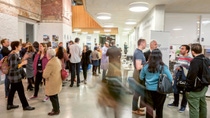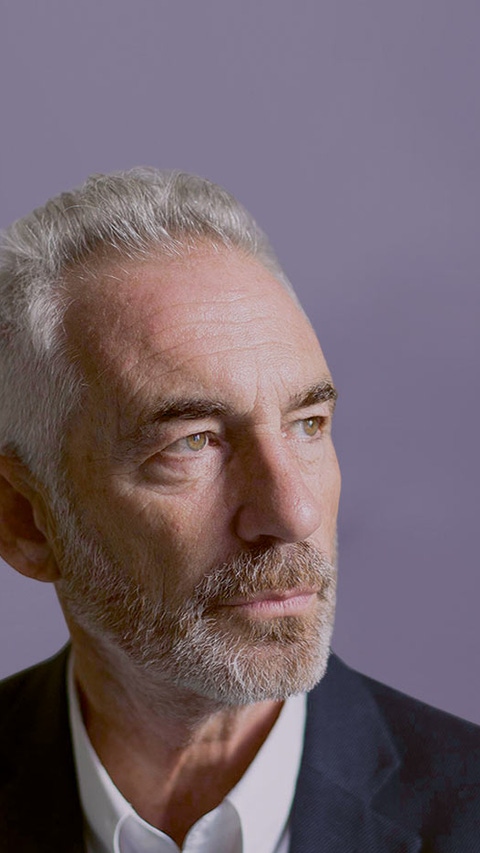Rethinking the economy
Tackling climate change requires a radical rethinking of how the economy serves our needs. Professor Tim Jackson argues that to survive on a planet with finite resources we must move beyond a system based on perpetual growth.
For decades, economies around the world have pursued the goal of growth as a means of improving people’s lives. But as our activities deplete ever more of the planet’s natural resources and we get dangerously close to causing irreversible climate change, do we need to rethink what we mean by prosperity – to make it a goal we can achieve while staying within planetary boundaries?
Creating Chemistry: Your most recent book argues that the idea of pursuing growth is a myth that has become dystopian. Why is that?
PROFESSOR TIM JACKSON: I believe we could be living in a better way if we did not have such a narrow focus on material wealth. I would replace it with the idea of prosperity, not as growth, but as progress of the human spirit, not as continual expansion, but as healthy balance. It’s an idea that can be traced back at least to the Greek philosopher Aristotle. He asks the fundamental question about what the good life is, what it means to live well. He doesn’t say to live well is to have more and more all the time. He says to live well is to have an appropriate balance. This is one of the lessons that we’ve learned during the pandemic – it is health rather than wealth that lies at the heart of our prosperity, and health is about balance rather than continually having more. It is about achieving quality of life, rather than simply quantity of output.
How do you sell the idea of post-growth to people who are still living in poverty or who aspire to a middle-class lifestyle?
The answer is that I don’t. The evidence is clear that, in the poorer parts of the world, better incomes, safer and cleaner housing, better energy sources and cleaner water supplies all contribute massively to an increase in prosperity and quality of life in very basic ways. There is no doubt that there are places where some increase in income is a good thing. The question is whether this is a process that should go on forever on a planet with limited resources. Is it not the responsibility of rich economies to develop a different kind of economy that isn’t driven by more and more to allow space so the poorest in the world can afford to have enough?

CUSP’s CYCLES project studies the lives of young people in seven cities on six continents to understand their lifestyles and aspirations and their ideas for living well within environmental limits.
Capitalism has been credited with pulling millions out of poverty and increasing standards of living in many parts of the world. Will this progress and innovation stagnate in a post-growth world?
I think it is wrong to assume that only the pursuit of profit will lead to innovation. Psychologists recognize two kinds of human motivation – extrinsic goals, such as money and status, and intrinsic goals, which are those deeply held desires for purpose and meaning that lead us to engage in social action, to solve problems, to dream of a better world. There is evidence that successful entrepreneurs are driven as much by intrinsic as by extrinsic goals. A post-growth economy could be richer in social innovation than a capitalistic economy that assumes only extrinsic motivations matter.
Why should a company pursue a post-growth agenda?
If your business model is predicated on the idea of continued growth and throughput, you are going to run up against environmental or resource-based limits. The impact material supply chains have on energy, climate, resources and waste places them at the heart of the change towards a sustainable economy that can operate within planetary boundaries. Businesses no longer operate in a world where resources are plentiful and the planetary impact is relatively small, so you need to be able to show that the value provided to society by what you produce is not undercut by the impacts that production chains are having on the environment.

What does it mean to live a good life within the ecological constraints of a finite planet? CUSP brings together people from all walks of life to develop new visions for prosperity.
What does this transformation involve?
Thirty years ago, when I started working on clean technologies, the focus was on the idea of a win-win – if you lose less materials out of the system you gain efficiency-based improvements. But today these simple efficiency models don’t go far enough. One way is to ask, what is the service provided by this product? That draws you into thinking whether that service could be provided in some other way. Another way is the circular economy, which I’m deeply in favor of. But for me it doesn’t stop with technological processes. It has to go a step further and ask whether what is being produced is in the service of human well-being – that’s where a company’s social license comes from.
Can digital advances in the form of the fourth industrial revolution lead to more sustainable growth?
Through digital technologies we can do things in better, more efficient ways. But this can also be dangerous. If wages and profits follow productivity growth, that means the people involved in these very clever technologies get very rich very fast. If that’s not transmitted through society in wages, then you begin to see a divided society.
What metrics should businesses use in your alternative model to measure success and attract investment?
People have in various ways tried to do this with ideas like the triple bottom line, that is people, planet and profit instead of the Milton Friedman mantra that the business of business is business. You could transform that idea into “the business of business is service, progress, purpose and the well-being of society.” When you talk to people who work in the most successful businesses on the planet, they want to engage in a discourse not only about accumulation of capital and status but also around purpose, human benefits and long-term progress. I think that sense of balance is needed at both the societal and the individual level. But it is difficult for it to be manifest in society because we’ve created institutions that legitimize the practices that lead to unequal wealth and accumulation at the expense of people and planet.
Are we measuring the wrong things in our economies as a whole?
A lot of measures are not fit for purpose. The biggest of those is gross domestic product. It is a good measure of the busyness of the economy, but it is not a good measure of the welfare of society. Some countries have begun to integrate broader and more meaningful metrics at the national level into their decision-making processes. For example, in New Zealand they use a living standards framework. There are also attempts to adjust gross domestic product to take into account the depreciation of natural capital or to include some measure of inequality. The critical thing is how you use these measures as decision-making processes to orient the direction of your economy and your society.
There has been a lot of talk about building back greener after the pandemic. What does that mean to you?
People think it means investing in equipment like wind turbines and solar panels. But from a carbon footprint perspective, among the green sectors are those that provide safety, security, social care and education. The social resources that improve and protect our quality of life are green because they do not rely so much on technology and equipment but on people’s time in the service of each other. A post-pandemic shift to a green economy is partly about building efficient carbon-neutral technologies, but it is also about creating a society that is employment rich because we’re investing in health and social care and the things that support the fabric of our society.

Art and culture are inherent to prosperity, according to CUSP. One focus is Finsbury Park, an area of rapid gentrification in London, England. CUSP is exploring the role cultural activities play here in understanding the good life.
What kind of world do you want to see in 30 years’ time?
We should be setting our sights on something richer and more fulfilling than the materialistic pursuit of accumulated wealth. It would be a much fairer world, in which people have more opportunities to enrich themselves by engaging in fulfilling work and play. There would be a stronger sense of community, better relationships, stronger societies and a cleaner environment.
What must we focus on to get there?
In studies, kids have told us they want a job in which they can make a meaningful contribution to society, yet we encourage them into a life that is materialistic, driven by technology, where you need a certain income to compete with your peers and to be in a comfortable situation. We should build an ethic of decency and service to society, where enriching society is the foundation for our shared prosperity. Windmills, solar panels and electric vehicles will matter. But it’s the social quality of the future that I feel most passionate about.



